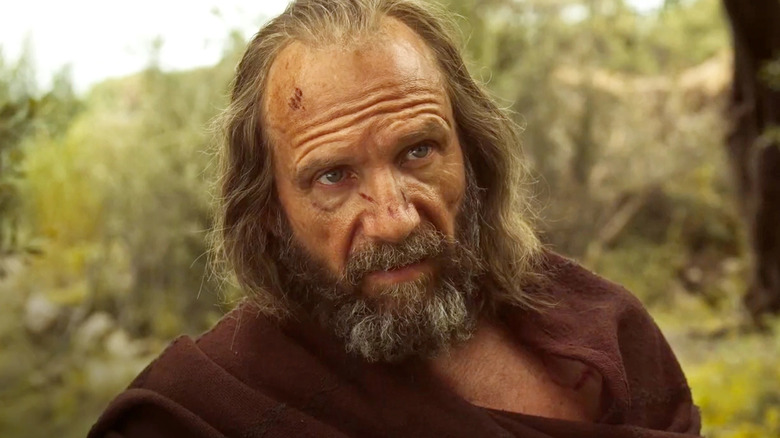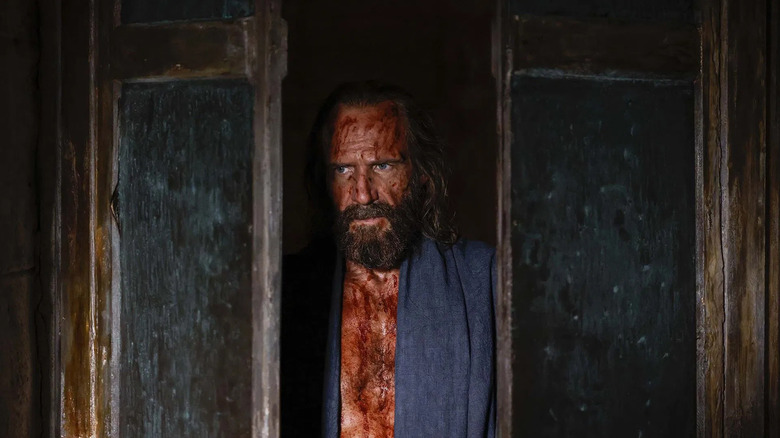Watch Out Christopher Nolan, This Adaptation Of The Odyssey Is Taking Over The Paramount+ Charts
Homer's epic "The Odyssey," as any seventh grader could tell you, began its life as part of an ancient Greek oral tradition, shared over campfires on long, balmy Athenian nights. The epic wasn't written down until maybe the seventh century BCE, finally codifying a tale that, no doubt, had undergone several hundred changes during its life. "The Odyssey" takes place after the events of the Trojan War. Its hero, Odysseus, had become trapped on a Mediterranean island with a beautiful nymph named Calypso, living with her for eight years. However, Odysseus misses his wife Penelope and eventually sets out on a journey home. Penelope has, in the interim, had to fend off a lot of dumb, freeloading, muscle-bound suitors who assume Odysseus is dead and want to horn in on his home.
The most famous passages from "The Odyssey" are about Odysseus' fantastical encounters with monsters and gods. The old soldier has to face off with a cyclops, sail past an island of sirens, traverse the waters between a multi-headed, rock-dwelling monster and a sucking whirlpool, and face a sorceress who turns his crew into pigs. The second half of "The Odyssey" is about Odysseus' final return home, and how he had to sneak into his own house in disguise to murder all the suitors.
The earliest filmed version of "The Odyssey" is likely the 1911 Italian adventure flick "L'Odissea," which can be watched online. The most famous screen adaptation may be Andrei Konchalovsky's 1997 TV miniseries version, which starred Armande Assante, although more people saw the Coen Bros. 2000 film "O Brother, Where Are Thou?," which transposed the story and some of the events of Homer's epic to Mississippi in 1937. The most recent adaptation was 2024's "The Return" with Ralph Fiennes as Odysseus.
"The Return" is now on Paramount+ and it's been tearing up the charts, having landed in the No. 1 spot (according to FlixPatrol). It's likely that audiences are doing some "Odyssey" homework in preparation for Christopher Nolan's upcoming adaptation of the epic, due in theaters on July 17, 2026.
The Return focuses on the neglected second half of The Odyssey
As mentioned, the best-remembered portions of "The Odyssey" all come from its first half, as that's the part with the gods and monsters. Any junior-high kid will likely be able to tell you about the man-eating Polyphemus, or when Odysseus was trapped between the rock-dwelling Scylla and the boat-swallowing Charybdis (where we get the phrase "between a rock and a hard place"). We all know about Circe, about the bag of wind given to Odysseus by Aeolus the god of the winds, and about the cannibalistic Laestrygonians. When schoolkids read "The Odyssey," though, teachers often mercifully shorten the second half, as it throws off our tender, modern notions of pacing. Books 13 through 24 are all about Odysseus finally landing back home in Ithaca, infiltrating his way back into his home, and slaying all the suitors.
"The Return" bypasses the familiar fantasy adventures, and begins at the start of Book 13. It also forgoes any notion of magic or monsters, sticking to a more grounded, realistic (and cheaper to film) human drama. Fiennes plays an age-appropriate Odysseus, and Juliette Binoche plays Penelope. Odysseus' son, Telemachus, is played by Charlie Plummer.
There is a lot of drama in the last half of "The Odyssey," which "The Return" delves into. There is, for instance, the matter of making a disguise, as well as the reasoning behind having to come up with a disguise in the first place. Odysseus can't just announce himself. Because of the suitors, Penelope is essentially a prisoner in her own home, forced to care for them and feed them according to local propriety. Telemachus is seen as a threat to the suitors, as he is Odysseus' heir, so they're plotting to kill him. The suitors are boning all the maids, and forcing Penelope to choose one of them to marry. Odysseus has to be sneaky about this.
One more Odyssey
"The Return" is an unusual film in the history of "Odyssey" adaptations because of its lack of magical elements. The gods are active participants in Homer's original epic, but are weirdly absent from "The Return," making every decision wholly Odysseus's. It's a humanist take on the material that expands the myth into something, well, human. "The Return" will also be useful to students who want a dramatization of the part of "The Odyssey" that often goes overlooked.
Although it won't be out until 2026, one has to wonder how much of Books 13 through 24 Nolan will include in his upcoming adaptation. Will Nolan focus on the monsters and fantasy violence, or will he, too, take a more humanist approach? Nolan's steely eye for science fiction as seen in films like "Inception," "Interstellar" and his Batman movies don't seem to have the same tone as the godlike dealings of "The Odyssey." It will be interesting to see if Nolan skews literary, toward peplum adventures, or just outright realism. If the latter, then those who saw "The Return" will be happy to have done their homework. It will be fun to compare Ralph Fiennes to Matt Damon. (Tom Holland will presumably be playing Telemachus.)
And while doing your homework, throw in the 1911 film as well. The 1997 miniseries is on Prime Video, so that can definitely round out a filmic Odyssey, and there's always an excuse to re-watch "O Brother, Where Are Thou?," which can be rented online. Or, best yet, gather with friends around a beach bonfire, dress in a robe, sit down, and try to remember as much of "The Odyssey" as you can. Continue the bardic traditions.


